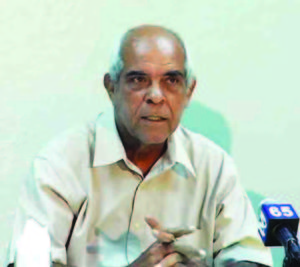With the recent announcement made by the Department of Energy to hire an overseas firm to assist with the auditing of the pre-contract costs for oil recovery, outspoken economist and social commentator, Ramon Gaskin, has said although Guyana lacks the capacity, no overseas company should be allowed to take full charge of this audit.
Gaskin’s argument is premised on the fact that only Guyanese will have Guyana’s interest at heart. He questioned whether there is any guarantee that an overseas firm, especially one that may have connections to oil companies operating in Guyana, will look out for Guyana’s interest.
“I do not have any confidence in any overseas company to look out for the interest in Guyana,” he said, while recalling that a few years ago; a Canadian-based company was hired to look into the tax regime of the gold mining sector and did nothing for Guyana.

“The only thing they came up with was to reduce the royalty of Omai, a Canadian company operating in Guyana. Therefore, I am saying, I have zero confidence. We have to have Guyanese to look out for Guyana’s interests. We cannot go to that route again,” he asserted.
Gaskin, a former presidential advisor, believes nothing is wrong with hiring an overseas company to assist Guyanese in understanding the more complex issues in oil and gas, but he thinks Guyanese should remain in charge of the entire auditing process.
He said, “Guyanese have to be in charge. We cannot put foreign people to audit the foreign people, they are all the same. We’ve had that experience before. We cannot go there again.”
Head of the Department of Energy, Dr Mark Bynoe told sections of the media that the plan is to hire an overseas company that would assist both the Guyana Revenue Authority (GRA) and the Auditor General’s Office to conduct the audit of the pre-contract costs.
The controversial US$460 million pre-contract costs that ExxonMobil has charged Guyana is yet to be audited. Finance Minister Winston Jordan is aware of the concerns that the sum is inflated and has noted that there is nothing much that could be done at this time.
The International Monetary Fund (IMF) has responded to a request for help to audit all costs to be recovered by ExxonMobil. GRA’s Commissioner General, Godfrey Statia said the IMF will be lending its expertise to audit the controversial pre-contract costs.
Statia said the IMF and the World Bank would be training GRA officers in the areas of petroleum accounting, cost recovery audits and other tax-related matters. He said help would also be provided to develop a risk assessment strategy for the sector.
It has been reported that the IMF and other institutions will be tasked with auditing, examining and verifying all available documentation and records necessary for charges and credits relating to the contractor’s activities under the Petroleum Agreement.
This means all books of accounts, accounting entries; material records and inventories, vouchers, payrolls, invoices and any other documents, and correspondence will be requested and checked thoroughly.
Chartered Accountant Christopher Ram had called for the US$460 million pre-contract costs to be audited. Based on his examination, he said the numbers were not adding up.
Ram said ExxonMobil is represented by three companies as the contractor for the Stabroek Block – Esso, CNOOC, and Hess. Using the financial statements of Esso and CNOOC, the only ones which were publicly available, he pointed out a few important things.
He highlighted for example, that the combined expenditure of Esso and CNOOC at December 31, 2015, was G$26 billion with reported losses of G$21 billion, giving a total of G$47 billion. In United States dollars, using a $200 exchange rate, Ram said that gives a total US$245 million, well short of the $460 million that the Government accepted in the Agreement with ExxonMobil.
To make up the total of US$460 million, Ram said Hess alone would have had to spend, in contract costs, some US$215 million or approximately G$46 billion, which he opined would defy logic. Ram stressed that the only satisfactory and acceptable resolution of this matter is a special audit independently undertaken.



